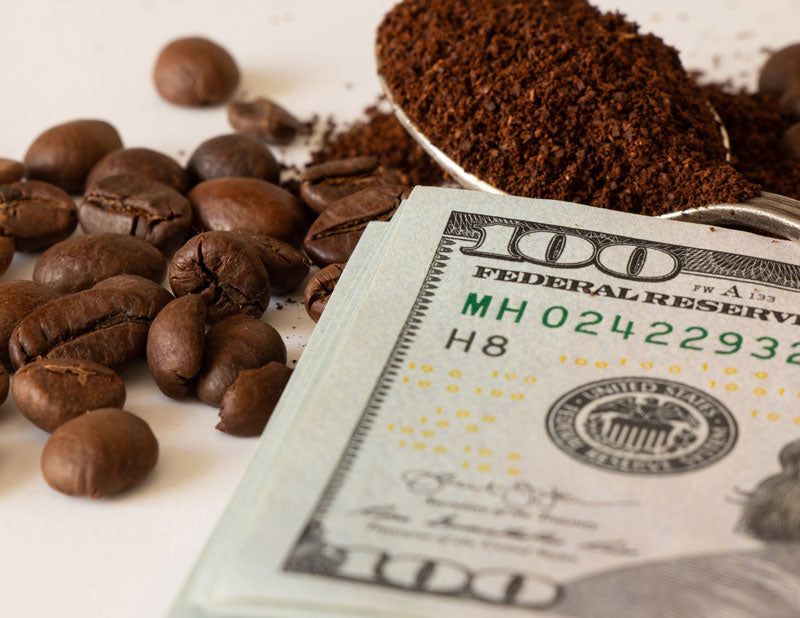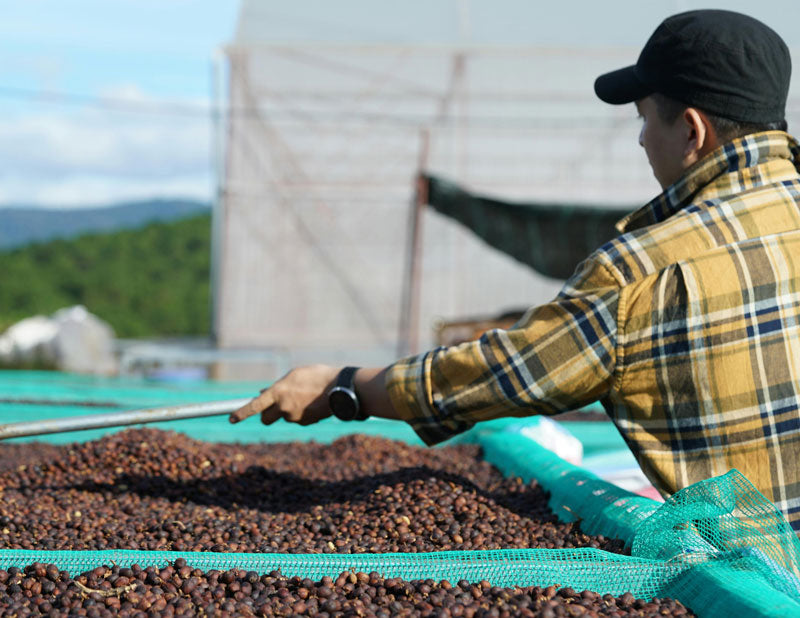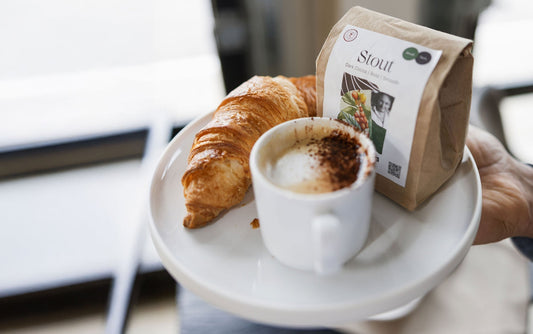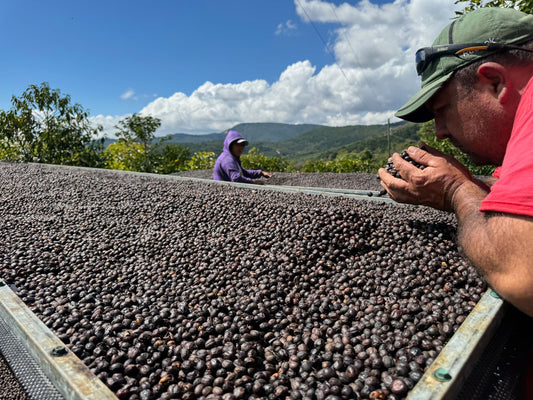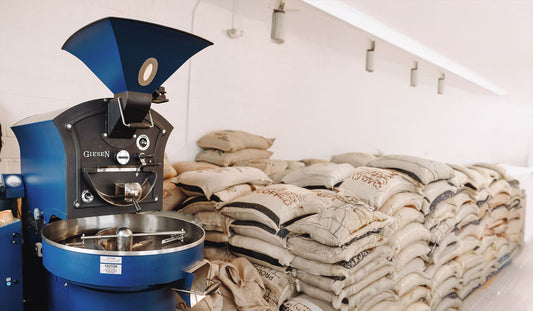The U.S. Consumes the Most Coffee, but Grows the Least
America loves coffee. It fuels our mornings, our meetings, and for many of us, is an integral part of our daily routine. But while the U.S. is the largest global consumer of coffee, it produces only 1% of what it drinks, and imports the other 99%.
We rely on smallholder producers in Ethiopia, Colombia, Honduras, Costa Rica, and more, people who dedicate their lives to caring for their soil and stewarding ecosystems most of us will never see.

So when a 10% tariff on imported coffee took effect in April 2025, it didn’t shift production, it threatened everyone across the supply chain: producers, roasters, and consumers.
In 2025, the U.S. raised its effective tariff rate to 22.5%, the highest since 1909, triggering price increases across nearly every imported product, including coffee.
These coffee tariffs don't create new jobs, they increase costs on all fronts and reduce access to sustainable, high-quality imports.
The Real Price: Farmers Losing the Future They Just Started Building
Sustainable coffee farming isn’t easy. It takes more labor, more investment, and more risk. But over the past decade, thousands of farmers have made the shift, adopting regenerative techniques, protecting their ecosystems, and building direct relationships with ethical roasters.
“We finally had solar dryers installed last year,” says one Honduran farmer Ebru has worked with in the past. “Now we might have to sell to the middlemen again.”

That shift speaks volumes. What was once a move toward independence and climate resilience is now threatened by trade policies, like the 2025 coffee tariffs, that make direct, ethical trade more expensive and less viable. With U.S. buyers rethinking orders and roasters trimming costs, the risk isn’t just economic. It’s a reversal of hard-won progress.
Tariffs like these don’t just disrupt business. They dismantle trust and undo climate adaptation efforts. They push farmers, many of whom are already on the brink, back into exploitative systems that pay less, demand more, and care little for the land.
Coffee Tariffs Impact Everyone, Not Just Farmers
This isn’t just a problem at origin. It echoes all the way through the supply chain.
- Producers lose contracts and face cash shortfalls.
- Roasters are forced to raise prices or reduce quality.
- Consumers see coffee prices rising and fewer ethical options.
According to the Yale Budget Lab, food prices alone have jumped 2.8% under the 2025 tariffs. Coffee, as a globally sourced crop, is part of that spike, making it harder for ethical brands to keep prices stable without cutting corners.
As a consumer, you’ll notice a decline in single-origin offerings and less transparency. More blends with vague sourcing and more labels that say “100% Arabica” but tell you nothing about how or where it was grown.
Even some ethical coffee brands are being forced to reconsider what they can realistically offer under these new conditions.
This isn’t the first time U.S. tariffs have promised protection but delivered instability.
In the early 1980s, during a wave of trade tensions, the Reagan administration imposed duties on Japanese electronics and Brazilian coffee (yes, we have it, check our single-origin Brazil coffee beans called Stout).
The result? Higher consumer prices, retaliatory trade measures, and long-term damage to import-reliant small businesses. It didn’t bring jobs back - it simply shifted supply chains to different middlemen, usually at higher cost.
A $5 Cup No Longer Buys What You Think It Does
Here's what happens inside your daily cup:
The farmer's share is already slim. Now, with rising import costs from coffee tariffs, the squeeze is even tighter, and farmers are often the ones who pay the price as roasters look for places to cut. The cup still costs $5, but who gets what is rapidly changing.
And with coffee prices rising, that $5 may soon be $5.50 or more, without necessarily supporting better coffee or practices.
The Farmer’s Share Keeps Shrinking
Coffee tariffs might sound like an abstract policy tool, but they translate into real losses for the families growing the coffee.
A 10% tariff becomes an approximate 20% drop in farmer income. This makes it harder to invest in sustainable coffee farming and easier to fall back into extractive trade systems.
Are Coffee Tariffs A Step Backward For Sustainability?
At COP28 in 2023, the U.S. committed to advancing sustainable agriculture. Programs under USAID and the USDA were focused on regenerative farming and carbon-smart production systems.
And yet, two years later, the U.S. imposed coffee tariffs that make it more expensive to import from countries actively investing in those very systems.

This inconsistency isn’t just confusing, it’s counterproductive. Tariffs are rewarding scale over sustainability and making it harder for ethical coffee brands to survive, let alone lead the industry forward.
The economic cost goes far beyond the price tag: U.S. GDP is projected to shrink 0.9 percentage points in 2025, with exports falling over 18%. This puts pressure on businesses that rely on global supply chains, like specialty coffee roasters.
FAQs
Why are coffee tariffs harmful to sustainability?
They increase costs for farmers using eco-friendly methods, which are often more expensive to maintain. This discourages the very practices global climate agreements aim to promote, including sustainable coffee farming.
Can the U.S. grow its own coffee?
No. Outside of Hawaii and Puerto Rico, the U.S. climate isn’t suitable for coffee cultivation. We rely almost entirely on imports which makes the impact of coffee tariffs even more far-reaching.
Are any countries exempt?
Some coffee from Mexico and Canada may qualify under the United States-Mexico-Canada Agreement (USMCA), which allows tariff-free access for goods that meet specific rules of origin. However, the vast majority of global coffee, from Africa, Central and South America, and Asia, is affected by the 2025 coffee tariffs.
How will this impact consumers?
Coffee prices are rising already, and you can expect fewer ethical options and more generic blends with less transparency. Even some ethical coffee brands are facing difficult trade-offs.
The Bottom Line: This Isn’t Just About Beans
This is about values. Equity. Climate. Trade. And your morning cup.
These coffee tariffs don’t just change prices. They change the terms of the entire coffee industry. But you can still make choices that matter.
So ask your local café where their coffee comes from. Support the roasters who are paying attention. Speak up when trade policies hurt the very people they claim to protect.
Because we’re all holding the evidence in our hands. And if farmers continue to lose ground, the coffee we drink will reflect it, in price, in quality, and in integrity.

